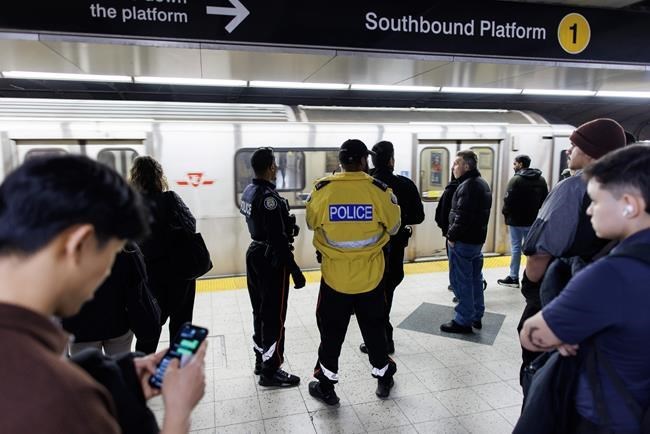TORONTO — The agency that operates Toronto's subway system has rejected a proposal by Bell Canada to revamp its wireless cell service model in a way to prevent Rogers from charging its rivals a fee for their customers to access the network, calling it "a non-starter."
The TTC will not consider Bell's request to require a joint-build model, in which all carriers would own a stake in the network infrastructure, spokesperson Stuart Green said in a statement.
On Wednesday evening, Industry Ministry François-Philippe Champagne called on Canada's major telecom companies to reach a deal that would allow any company to access the TTC network after Rogers Communications Inc.'s purchase of the existing operations. Rogers has said it is open to other providers signing on.
Bell president and CEO Mirko Bibic responded to the minister that his company would only take part in the network if it has a chance to help build it with the other carriers.
"The 'neutral host model,' where one company builds the infrastructure and others join through an operating agreement, is common practice and works well in other jurisdictions," said Green in an email.
"To suggest, as this letter does, we tear up the contract reached after an open and public bidding process and instead award our wireless services to another consortium without a public tender is a non-starter for the TTC."
Green said the TTC "stands by the public and transparent" open tender process that began in 2009, which resulted in Australia's BAI Communications being awarded a $25-million contract to build and operate the TTC's public Wi-Fi and cellular network three years later.
BAI agreed earlier this month to sell its Canadian operations to Rogers, which plans to build a 5G network for the entire subway system in around two years.
"Bell willingly participated in that open tender process, ultimately being outbid by $20 million," Green said.
"The current proposal between BAI and Rogers is a private business transaction/acquisition which Bell or others could have entered into at any time over the past 12 years."
He said the agency "looked forward to all Canadian telcos banding together to provide wireless access to their customers while on the TTC, as is routinely done across the country on transit systems and in other public facilities."
But Bell spokeswoman Jacqueline Michelis noted that while the 2009 bidding process was open, "Rogers’ acquisition of BAI with TTC approval was not subject to an open bid and other parties, including Bell, were not invited to participate."
"We have proven time and again that the joint consortium model works for Canada," she said in an email, pointing to Montreal's Metro system and the Eglinton Crosstown LRT in Toronto.
"This joint solution can be found in hundreds of public spaces across the country, including Toronto’s Union Station and in Ottawa."
In a response letter to Champagne on Thursday, Rogers president and CEO Tony Staffieri urged the minister to "not get caught up in the rhetoric of our competitors, particularly the response from Bell ... which included many inaccuracies and unfounded accusations that are disrespectful to the process and are not in the best interests of the TTC and its riders."
He reiterated Rogers is committed to "working with other wireless carriers if they choose to commit to work with us in the best interests of all."
"In this specific situation relating to the TTC, we have been working with the TTC and BAI for over a year to open up access to the transit system," Staffieri said.
"They have made it clear to us that no other carrier, other than Freedom, has made any constructive attempt to work with them to provide wireless services in the subway system."
Telus did not immediately respond to a request for comment.
In his letter to Champagne on Wednesday, Bibic called it "astounding" that the project "would be awarded to one party without a transparent open-bid process."
Bibic told Champagne that Bell and Telus have jointly offered to acquire the BAI contract if Rogers won't agree to a joint-build model on its own or do so by requirement from the TTC. Bibic said Ottawa and the CRTC should compel Rogers to implement the joint-build model if the company resists.
Telus said it agreed with Bell that "a consortium approach to building the TTC network" is the best way forward.
Only Freedom Mobile signed on to provide coverage to its customers since BAI won the rights to build the network.
While customers not with Freedom have been unable to use BAI’s network other than for 911 emergency calling for more than a decade, calls to make the system work for all Torontonians have surfaced after a spate of violent incidents on the TTC system.
As a condition of Rogers’ $26-billion purchase of Shaw Communications Inc., Quebecor acquired Freedom Mobile from Shaw.
This report by The Canadian Press was first published April 20, 2023.
Companies in this story: (TSX:RCI.B, TSX:QBR.B, TSX:BCE, TSX:T)
Sammy Hudes, The Canadian Press



